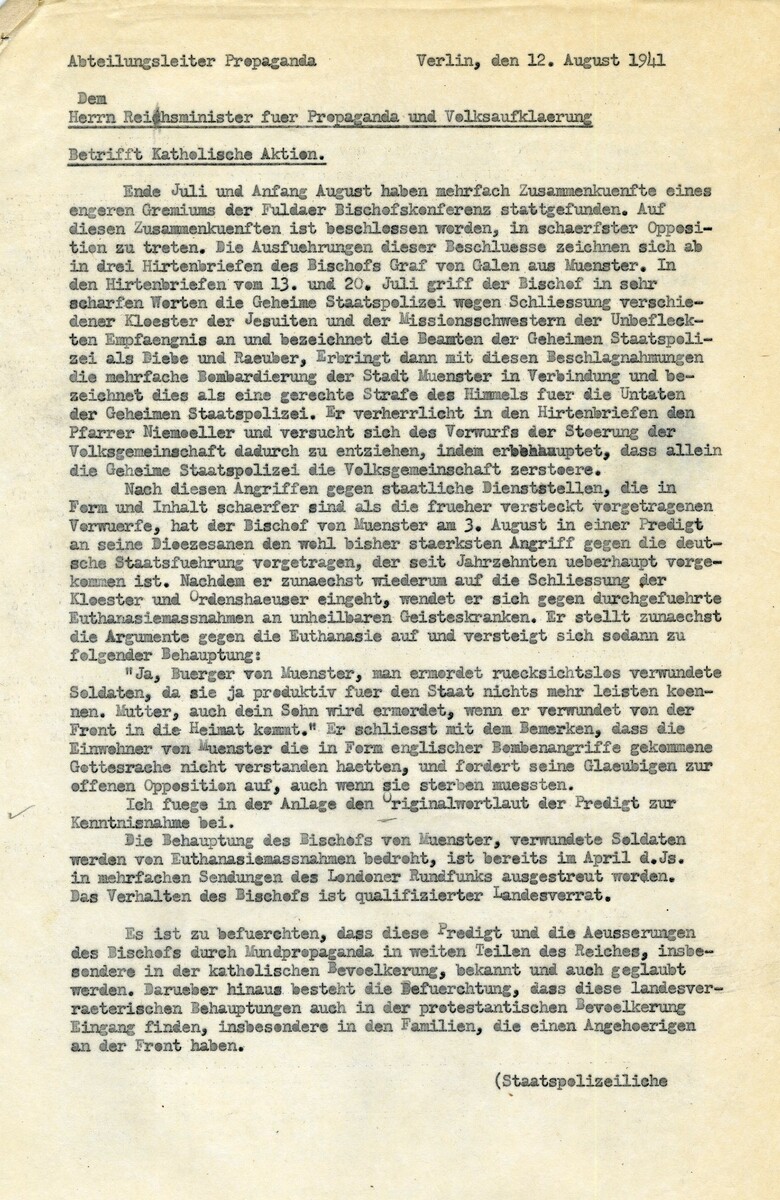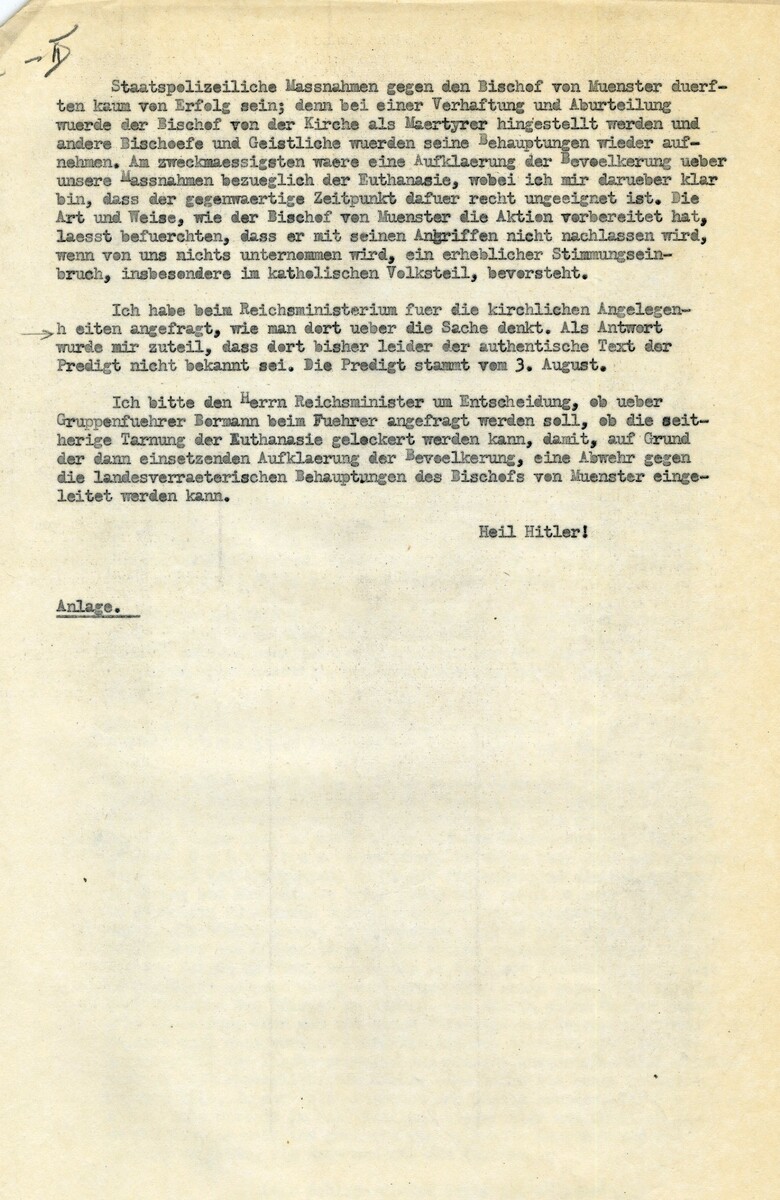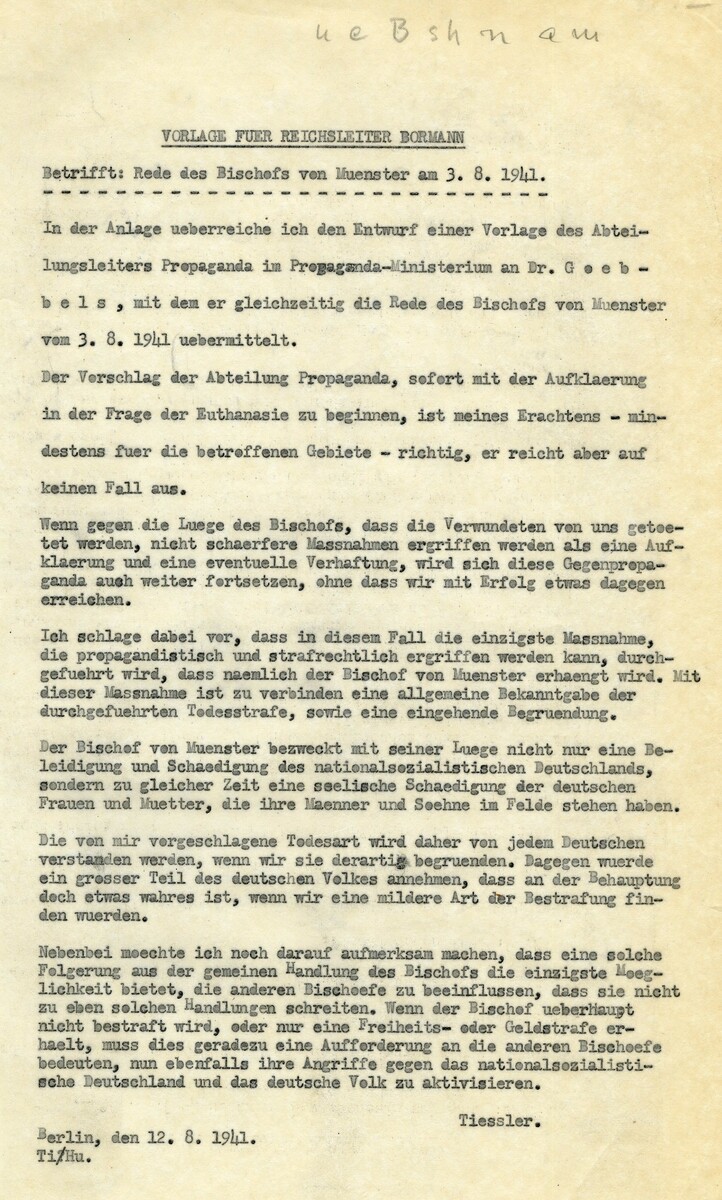Source
I. Excerpt from Bishop von Galen’s Sermon (August 3, 1941)
[…]
I am reliably informed that in hospitals and homes in the province of Westphalia, lists are being prepared of inmates who are classified as “unproductive members of the national community,” who are to be removed from these establishments and shortly thereafter killed. The first group of patients left the mental hospital at Marienthal, near Münster, in the course of this week.
German men and women! Article 211 of the German Penal Code is still in force, in these terms: “Whoever kills a man of deliberate intent is guilty of murder and punishable with death.” No doubt in order to protect those who intentionally kill these poor men and women—members of our families—from this punishment laid down by law, the patients who have been selected for killing are removed from their home area to some distant place. Some illness or other is then given as the cause of death. Since the body is immediately cremated, the relatives and the criminal police are unable to establish whether the patient had in fact been ill or what the cause of death actually was. I have been assured, however, that in the Ministry of the Interior and the office of the Chief Medical Officer, Dr. Conti, no secret is made of the fact that a large number of mentally ill persons in Germany have already been killed with intent and that this will continue.
Article 139 of the Penal Code provides that “anyone who has knowledge of an intention to commit a crime against the life of any person . . . and fails to inform the authorities or the person whose life is threatened in due time . . . commits a punishable offence.” When I learned of the intention to remove patients from Marienthal I reported the matter on 28 July to the state prosecutor of Münster Provincial Court and to the Münster chief of police by registered letter, in the following terms:
“According to the information I have received it is planned in the course of this week (the date has been mentioned as 31 July) to move a large number of inmates of the provincial hospital at Marienthal, classified as “unproductive members of the national community,” to the mental hospital at Eichberg, where, as is generally believed to have happened in the case of patients removed from other establishments, they are to be killed with intent. Since such action is not only contrary to the divine and the natural moral law but under article 211 of the German Penal Code ranks as murder and incurs the death penalty, I hereby report the matter in accordance with my obligation under article 139 of the Penal Code and request that steps should at once be taken to protect the patients concerned by proceedings against the authorities planning their removal and murder, and that I may be informed of the action taken.”
I have received no information of any action by the State Prosecutor or the police. I had already written on 26 July to the Westphalian provincial authorities, who are responsible for the running of the mental hospital and for the patients entrusted to them for care and for cure, protesting in the strongest terms. It had no effect. And I am now told that 800 patients have already been removed from the hospital at Warstein.
We must expect, therefore, that the poor, defenceless patients are, sooner or later, going to be killed. […]
Source of English translation: Sermon by the Bishop of Münster, Clemens August Count von Galen, on Sunday, August 3, 1941, in St. Lambert’s Church, Münster; reprinted in Beth A. Griech-Polelle, Bishop von Galen: German Catholicism and National Socialism. New Haven: Yale University Press, 2002, pp. 189-91. Translation attributed to Saint Lamberti Church in Münster: speech printed in a pamphlet distributed by the Saint Lamberti Church. Republished here with permission by the Diocesan Archives, Münster. Edited slightly by GHI staff.
Source of original German text: Bistumsarchiv Münster, Fremde Provenienzen, A 8. Schreibmaschinenabschrift. Überschrift: Niederschrift der Predigt des Bischofs von Münster, Sonntag, den 3. August 1941, in der St. Lambertikirche in Münster; reprinted in Johann Neuhäusler, Kreuz und Hakenkreuz: Der Kampf des Nationalsozialismus gegen die katholische Kirche und der kirchliche Widerstand. 2nd edition. Munich: Verlag Katholische Kirche Bayerns, 1946, part II, pp. 364–66.
II. Government Correspondence about Galen’s Sermon and the Charges Raised against Him (August 12–13, 1941)
Head of Propaganda Section
Berlin, August 12, 1941
To
the Reich Minister for Propaganda and Popular
Enlightenment
Regarding: Catholic Action
In late July and early August there were several meetings of a select committee of the Fulda bishops’ conference. During those meetings, it was decided to mount the sharpest opposition [against the regime]. The impact of those decisions becomes visible in three pastoral letters written by Bishop-Count von Galen of Münster. In his pastoral letters of July 13 and 20, the bishop attacks the Gestapo with very pointed words for its closure of various Jesuit monasteries and nunneries of the missionary sisters of the Immaculate Conception, and he calls the Gestapo officers thieves and robbers. He then draws a connection between those confiscations and the multiple [aerial] bombardments of the city of Münster, and he calls the latter a just punishment by the Heavens for the atrocities committed by the Gestapo. In the pastoral letters, he glorifies the pastor [Martin] Niemoeller and seeks to dodge accusations of disturbing the national community [Volksgemeinschaft] by claiming that it is the Gestapo alone that is destroying the national community.
Following these attacks on state authorities, which were harsher in tone and content than his earlier and more obliquely stated accusations, the Bishop of Münster, speaking on August 3 in a sermon to members of his diocese, issued possibly the strongest attack against the German political leadership that has been made in decades. After initially addressing the closure of monasteries and nunneries, he goes on to oppose the euthanasia measures carried out on the incurably mentally ill. He first lists the arguments against euthanasia and then goes so far as to make the following claim: “Yes, citizens of Münster, they are ruthlessly murdering wounded soldiers since they can no longer productively work for the state. Mother, your son, too, will be murdered if he returns home from the front wounded.” He closes with the remark that the inhabitants of Münster do not understand that God’s revenge comes in the form of English air raids, and he calls upon his faithful to openly oppose us even if it means they should die.
I am attaching the original wording of the sermon for your information.
The claim made by the Bishop of Münster that wounded soldiers were threatened by euthanasia measures was previously spread in April of this year by several programs on London’s broadcasting service. The bishop’s behavior is qualified treason.
It is to be feared that this sermon and the bishop’s statements will become known and be believed in large parts of the Reich, especially among the Catholic population. Moreover, there is concern that these treasonous claims will also spread among the Protestant population, especially among those families who have a family member at the front.
State Police measures against the bishop would hardly prove successful; for, in case of arrest and sentencing, the bishop would be portrayed as a martyr by the Church, and other bishops and clerics would repeat his claims. The most advisable course of action would be to educate the public about our measures regarding euthanasia, although I realize that the current moment is rather inappropriate for this. The manner in which the Bishop of Münster has prepared his action raises concerns that he will not cease his attacks, and unless we take action, public opinion will take a considerable negative turn, especially in the Catholic segment of the population.
I asked the Reich Ministry for Church Matters for their thoughts on this issue. The reply I received stated that unfortunately the authentic text of the sermon was thus far not known to them. The sermon is from August 3.
I am asking the Reich Minister for a decision about whether group leader Bormann should be asked to inquire of the Führer whether the current secrecy of the euthanasia program could be relaxed so that a defense against the bishop of Münster’s treasonous claims may be launched on the basis of the resulting education of the public.
Heil Hitler!
Enclosure
***
Secret.
Draft for Reich leader Bormann!
Regarding:
Sermon by the Bishop of Münster.
After the ministerial conference, Dr. Goebbels spoke to me about the Bishop of Münster’s sermon. He said he did not know what effective measures could be taken at the moment.
I explained to him that, in my opinion, there was only one effective measure at the moment, namely, to hang the bishop. I told him I had already informed Reich leader Bormann to that effect.
To this Dr. Goebbels said that this was a measure that only the Führer himself could decide on. He was concerned, though, that if anything were done to the bishop, the population of Münster would be lost to our cause during the war. One could say the same of the whole of Westphalia as well.
I pointed out to him that it was only necessary to expose the rotten lie by the appropriate propaganda. That way it should be possible to not only make the measure plain to the local population, but also to create outrage against the bishop among them.
To this, Dr. Goebbels once again replied that the Führer was certainly going to make a decision about this himself.
He then addressed the fact that, in his opinion, it was more appropriate not to challenge the churches during wartime, but to try to steer them according to our interests as far as possible. This was why he had ordered the meeting with our fellow party member Gutterer at the time. He had not pursued this path any further since the party chancellery had demanded absolute rejection and a public break [with the Church]. As much as he—unlike other Reich leaders—thought it was an obvious course of action to ban the church press since, in this case, he truly had a reason and an excuse to offer the Church that kept up appearances, he still was of the opinion that it was more appropriate to keep up appearances towards the churches during the war. One must only ever attack an enemy when one is able to answer the enemy’s counterattack effectively. Yet this would be exceedingly difficult in the case of a counterattack by the Church during the war, indeed, almost impossible. Revenge was a dish best enjoyed cold, he said. In politics one had to be able to wait. The Führer had demonstrated this once again very clearly in the case of Russia. If it had been for him [Goebbels], we would act towards the churches during the war as if . . . [rest of the page illegible].
I explained to him that the path pursued thus far had produced the result that the church side had come out into the open and had thus given us valuable documents for fighting it after the war.
Dr. Goebbels said that, in his opinion, this measure would have been possible after the war without the documents as well, while the effects of the church documents were now creating great difficulties for us with regard to public opinion. In any case, it was necessary to create a clear rule for the future as to which path must be pursued. In the considerations that had to be made in this context we must not let ourselves be guided by the heart but by clear reason alone.
Personally, I am of the opinion that if the Führer agrees with my suggestion to hang the bishop, we should continue to pursue the current strategy. However, should the Führer reject the suggestion and postpone a reckoning for this question, too, until after the war, I would ask you to consider whether Dr. Goebbels should try, as far as possible, to pursue the path he suggested.
Tiessler
Berlin, August 13, 1941
Source: Rev. Edmund A. Walsh SJ Papers, Box 7, Folder 449, Booth Family Center for Special Collections, Georgetown University Library, Washington, DC.


